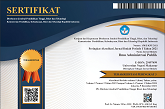Analysis on The Effect of Compensation, Discipline and Motivation Toward Performance of Employees of Mandiri Utama Sejahtera Corporation
(1) Universitas Pamulang
(*) Corresponding Author
DOI: https://doi.org/10.26858/jiap.v10i1.13577
Abstract
This study aims in examining the problem of employee performance that has decreased. The main objective of this research is to find out the phenomenon and to obtain empirical evidence and conclusions about the effect of compensation, discipline and motivation toward the performance of employees of Mandiri Utama Sejahtera corporation. This research uses a quantitative design method, explanatory research, by testing the survey technique hypothesis, the questionnaire uses a Likert scale of 4, using a saturated sample, which means using the entire population of 96 employees with headquarters and 5 warehouses in several areas. The results of the study were processed using data analysis techniques: (1) validity and reliability tests; (2) classic assumption test (normality, homogeneity, heteroscedasticity and multicollinearity test); (3) coefficient of determination (R2); (4) simple and multiple regression models; (5) hypothesis testing with partial test (t test) and simultaneous (F test). Based on the results of the study it was found that the F test showed a very significant effect on the compensation variable (X1), the discipline variable (X2), and the motivation variable (X3) together on the Performance variable (Y). This is evidenced by the calculated Fcount (49,460)> Ftable (2.70) and the significance is less than 5% (0,000 <0.05). R value (correlation) is 0.786 and R Square value (determination) is 0.617, indicating that the variable Y (employee performance) is influenced by variable X1 (compensation), variable X2 (discipline), and variable X3 (motivation) together, of 61.70% and the remaining 38.30% is influenced by other factors not examined. So the conclusion of the research results shows that there is a positive and significant influence of compensation, discipline and motivation on the performance of employees of Mandiri Utama Sejahtera corporation.
Keywords
Full Text:
PDFReferences
Bebchuk, L. A., & Fried, J. M. (2012). Executive compensation as an agency problem. In The Economic Nature of the Firm: A Reader, Third Edition. https://doi.org/10.1017/CBO9780511817410.026
Bircan, İ., & Gençler, F. (2015). Analysis of Innovation-Based Human Resources for Sustainable Development. Procedia - Social and Behavioral Sciences, 195, 1348–1354. https://doi.org/https://doi.org/10.1016/j.sbspro.2015.06.321
Brown, S., Gray, D., McHardy, J., & Taylor, K. (2015). Employee trust and workplace performance. Journal of Economic Behavior & Organization, 116, 361–378. https://doi.org/https://doi.org/10.1016/j.jebo.2015.05.001
Core, J. E., Holthausen, R. W., & Larcker, D. F. (1999). Corporate governance, chief executive officer compensation, and firm performance. Journal of Financial Economics. https://doi.org/10.1016/S0304-405X(98)00058-0
Doyle, S. (2019). Section 6 - Discipline-Specific Quality Management (S. B. T.-Q. M. in F. S. Doyle (ed.); pp. 245–323). Academic Press. https://doi.org/https://doi.org/10.1016/B978-0-12-805416-1.00006-2
Freitas, V., & Duarte, M. (2017). Motivation at work: Case studies of Portuguese SMEs. Tékhne, 15(2), 88–99. https://doi.org/https://doi.org/10.1016/j.tekhne.2017.11.002
Gerhart, B. (2008). Compensation. In The Routledge Companion to Strategic Human Resource Management. https://doi.org/10.4324/9780203889015-25
Kim, H. S., & Jang, S. (Shawn). (2020). The effect of increasing employee compensation on firm performance: Evidence from the restaurant industry. International Journal of Hospitality Management, 88, 102513. https://doi.org/https://doi.org/10.1016/j.ijhm.2020.102513
Kusuma, I., & Ardana, K. (2014). Pengaruh Penempatan dan Kompensasi Terhadap Kepuasan Kerja dan Kinerja Karyawan. E-Jurnal Manajemen Universitas Udayana.
Levine, D. K., & Modica, S. (2016). Peer discipline and incentives within groups. Journal of Economic Behavior & Organization, 123, 19–30. https://doi.org/https://doi.org/10.1016/j.jebo.2015.12.006
Nicolau, C., & Foris, T. (2018). Human Resources Crisis: Identifying Future Entrepreneur’s Profile in Romania. Procedia - Social and Behavioral Sciences, 238, 572–581. https://doi.org/https://doi.org/10.1016/j.sbspro.2018.04.037
Niswaty, R., Rusbiati, S., Jamaluddin, J., & Salam, R. (2017). The Influence of Teacher’s Reinforcement for Students Motivation. International Conference on Education, Science, Art and Technology, 148–152.
Saggaf, M. S., Nasriyah, N., Salam, R., & Wirawan, H. (2018). The Influence of Teacher’s Pedagogic Competence on Learning Motivation of Student of Office Administration Expertise Package.
Sastrohadiwiryo. (2010). Manajemen Tenaga Kerja Indonesia Pendekatan Administrative dan Operasional. Bumi Aksara.
Sujatha, R., & Krishnaveni, R. (2018). Knowledge creating ba as a determinant of work performance of employees: An empirical analysis among pump manufacturing firms in South India. Asia Pacific Management Review, 23(1), 45–52. https://doi.org/https://doi.org/10.1016/j.apmrv.2017.01.006
Sunarsi, D. (2014). Pengaruh Gaya Kepemimpinan, Disiplin dan Motivasi Terhadap Kinerja. Tesis. Fakultas Ekonomi Universitas Pamulang.
Sunarsi, D. (2018a). Pengaruh Gaya Kepemimpinan, Motivasi Dan Disiplin Kerja Terhadap Kinerja Pendidik Yayasan Marvin. Inovasi, 5(1), 1–18.
Sunarsi, D. (2018b). Pengaruh Gaya Kepemimpinan dan Disiplin Kerja Terhadap Kinerja Karyawan Pada CV. Usaha Mandiri Jakarta. JENIUS, 1(2).
Sunarsi, D., & Yuliani, I. (2019). Pengaruh Gaya Kepe Mimpinan Dan Budaya Organisasi Terhadap Kinerja Karyawan Pada Bank BTN KANTOR CABANG TANGERANG. Jurnal Semarak, 2(1).
Vardarlıer, P. (2016). Strategic Approach to Human Resources Management During Crisis. Procedia - Social and Behavioral Sciences, 235, 463–472. https://doi.org/https://doi.org/10.1016/j.sbspro.2016.11.057
Waris, A. P. M. dan A. (2015). Effect of Training, Competence and Discipline on Employee Performance in Company (Case Study in PT. Asuransi Bangun Askrida). Procedia - Social and Behavioral Sciences. https://doi.org/10.1016/j.sbspro.2015.11.165
Article Metrics
Abstract view : 906 times | PDF view : 228 timesRefbacks
- There are currently no refbacks.
Copyright (c) 2020 Rahmi Hermawati

This work is licensed under a Creative Commons Attribution 4.0 International License.
Diterbitkan oleh:
Program Studi Ilmu Administrasi Publik
Program Pascasarjana Universitas Negeri Makassar
JIAP Index By:

This work is licensed under a Creative Commons Attribution 4.0 International License.









